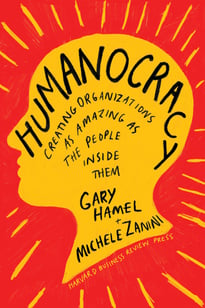 There are times we need someone to believe in us, to see beyond ourselves, to recognize our strengths, our purpose, to challenge us to greatness.
There are times we need someone to believe in us, to see beyond ourselves, to recognize our strengths, our purpose, to challenge us to greatness.
In some cases, this is involves removing barriers, eliminating restrictions, enabling us.
Humanocracy authors Gary Hamel, and Michele Zanini see bureaucracy as the barrier to create an environment where everyone is inspired to give their best.
How do you move from an organization model that emphasizes compliance to one that energizes contribution?
“Battles are won by the power of the mind” ~Napoleon
This is where it starts, in our mind, with a belief we can change and make things better, not only for our company, but for the people who work with us. Engage them in meaningful work, to feel they’re contributing to a greater cause.
In many ways Humanocracy replicates ideas and concepts from Flight of the Buffalo by James Belasco and Ralph Stayer. Stayer was CEO of Johnsonville Sausage. Tom Peters lauded his company in Thriving on Chaos. Tom Peters Blog on Continuous Learning in the Workplace shares, Johnsonville’s striving to have people "being all that they can be,” as an aspiration. SAUSAGE FACTORY HOG WILD ABOUT LIFELONG LEARNING shares Stayer’s passion ''Watching people grow is my No. 1 joy. It is unconscionable for workers not to have the chance to use their full talents.'' Stayer’s belief, ''People want to be great,'' to allow everyone to be, ''the instrument of their own destiny.''
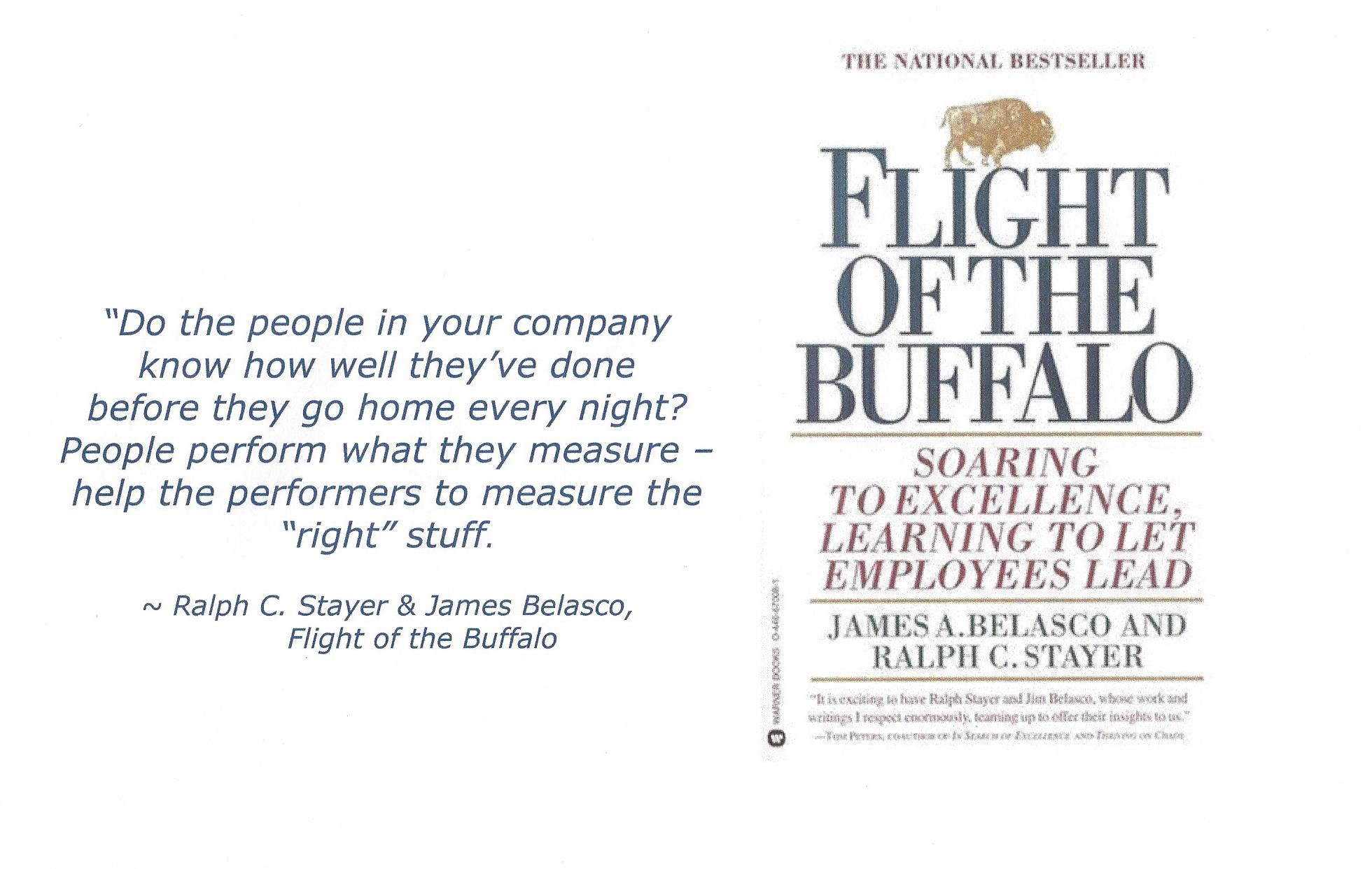 Humanocracy’s ideas aren’t new, they expand these concepts.
Humanocracy’s ideas aren’t new, they expand these concepts.
Companies like Morning Star, 3M, Nucor, Haier, Vinci, W.L. Gore, Google, and Bridgewater Associates exemplifying Humanocracy practices.
Here’s how Michelin got started.
Responsibilization
In the mid-2000s Michelin launched the Michelin Manufacturing Way (MMW), a corporatewide program to improve productivity via standardized processes, tools, dashboards, and performance audits. They called it Responsibilization. Michelin’s factory leaders grew concerned the project crowded out local initiative and creativity. It seemed at odds with a famous dictum of the company’s cofounder Edouard Michelin: “One of our principles is to give responsibility to the person who carries out a given task because he knows a lot about it.” There was concern the pendulum had swung too far toward centralization.
Jean-Michel Guillon, an executive from the corporate manufacturing department, hosted a workshop in early 2012. Workshop attendees agreed, frontline teams needed greater autonomy to pursue their own goals and improve local operations.
One of the workshop’s most vocal participants was Bertrand Ballarin, who was nearing the end of his tour as manager of Michelin’s Shanghai plant.
Ballarin had a reputation for rescuing underperforming factories. Before turning around the Shanghai plant, he had averted the closure of a factory in central France by shifting its focus toward airplane tires. By focusing on the “social dimension,” Ballarin built a shared purpose, upgraded worker skills, and gave production teams more freedom.
Ballarin started an off-the-radar project in 2013 persuading a few frontline supervisors to run a bold experiment in decentralization.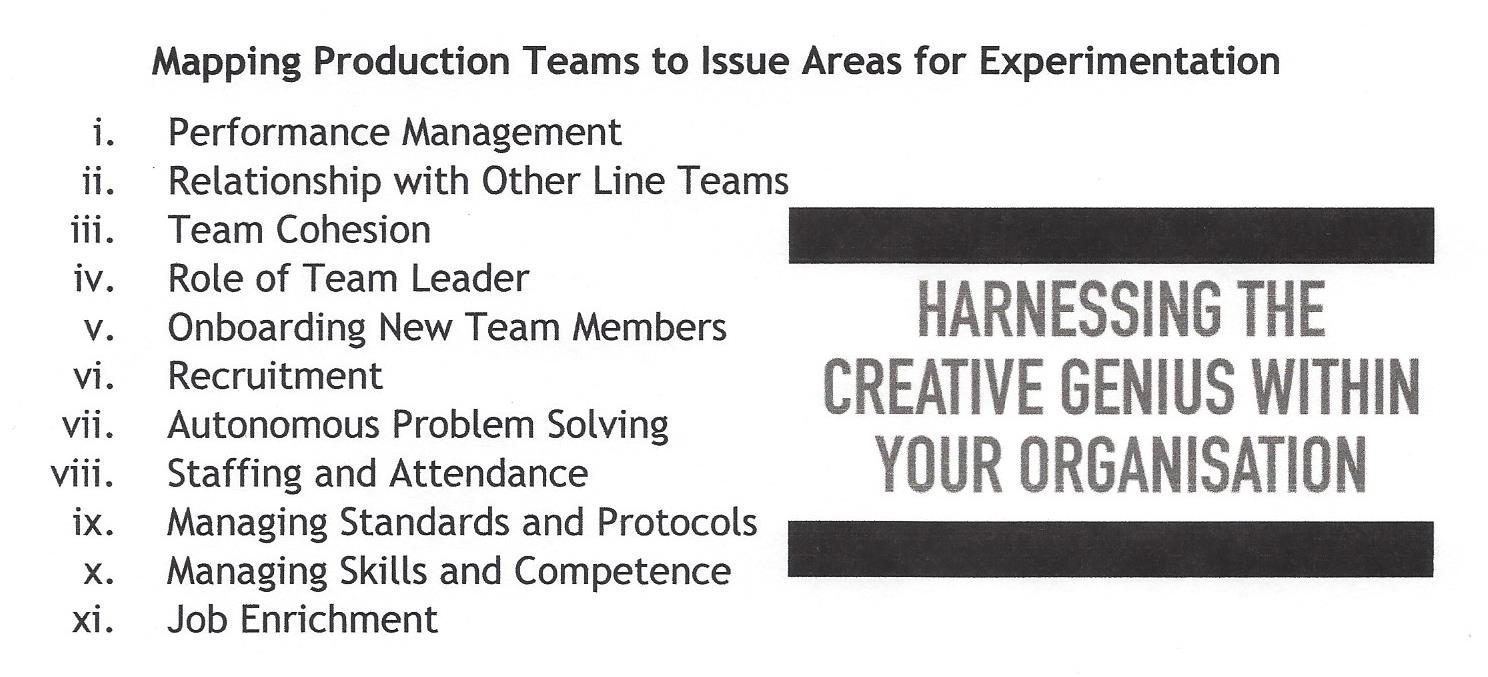
Ballarin held a deep conviction: if people were inherently creative and inclined to be passionate about their work, they should take the lead in designing their own work environments. Ballarin believed employees, not corporate staffers, should take the lead in “defining what autonomy and accountability mean for them.”
“We had been organizing work with an exceedingly narrow view of human beings. We assumed that people would exert effort only if closely supervised or motivated by pay. As a result, people in our factories were using only a fraction of their capacities.”
A MAPP
Ballarin sketched the outlines of a bottom-up initiative labeled MAPP—a French acronym for “autonomous management of performance and progress.”
See the seven tenets and the eleven issues of experimentation.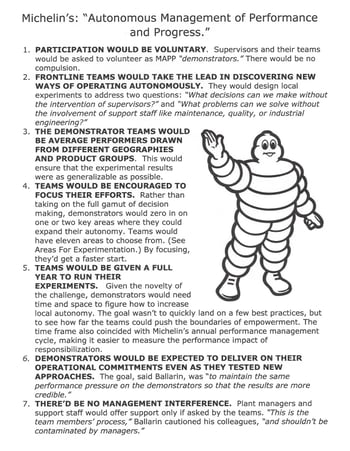
Among the first to sign on was the assembly crew in Michelin’s Le Puy tractor tire plant. Olivier Duplain, a team leader, explained his enthusiasm for MAPP: “When I started at the company in 2011, I quickly noticed that a lot of expertise on the shop floor was being wasted. I was convinced we could get much, much more from our people. I viewed the demonstrator project as a very interesting opportunity and when I suggested this to the team, everyone was interested.”
The tipping point, says Ballarin, came when the teams figured out no one was going to stop them. The experience of two demonstrators, in Le Puy and Homburg, are typical of how the process played out. He’ll discover their success next blog.
Watch this 2 minute 30 second video by Tom Peters. How you are doing with your people?
First who, then what. It’s a Strategic Discipline principle to Scaling Up your business. The Right People, doing the Right Things, Right. To create an environment where everyone is inspired to give their best, contact us today to schedule a free exploratory meeting.
Growth demands Strategic Discipline.
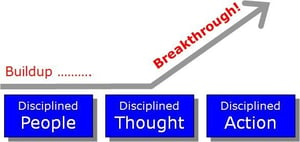 To build an enduring great organization, requires disciplined people, disciplined thought, disciplined action, to produce superior results, and make a distinctive impact in the world.
To build an enduring great organization, requires disciplined people, disciplined thought, disciplined action, to produce superior results, and make a distinctive impact in the world.
Discipline sustains momentum, over a long period of time, laying the foundations for lasting endurance.
-2.jpg?width=300&name=3%20Disciplines%20of%20Execution%20(Strategic%20Discipline)-2.jpg) A winning habit starts with 3 Strategic Disciplines: Priority, Metrics and Meeting Rhythms. Forecasting, accountability, individual, and team performance improve dramatically.
A winning habit starts with 3 Strategic Disciplines: Priority, Metrics and Meeting Rhythms. Forecasting, accountability, individual, and team performance improve dramatically.
Meeting Rhythms achieve a disciplined focus on performance metrics to drive growth.
Let Positioning Systems help your business achieve these outcomes on the Four most Important Decisions your business faces:
|
DECISION |
RESULT/OUTCOME |
|
PEOPLE |
|
|
STRATEGY |
|
|
EXECUTION |
|
|
CASH |
|
Positioning Systems helps mid-sized ($5M - $250M) business Scale-UP. We align your business to focus on Your One Thing! Contact dwick@positioningsystems.com to Scale Up your business! Take our Four Decisions Needs Assessment to discover how your business measures against other Scaled Up companies. We’ll contact you.
NEXT BLOG – Michelin’s Success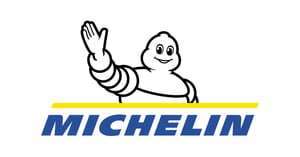
How powerful are the results when front line people take the lead in designing their own work environments? Next week examples of Michelin’s successes.






.jpeg?width=150&height=135&name=Hand%20with%20marker%20writing%20the%20question%20Whats%20Next_%20(1).jpeg)

